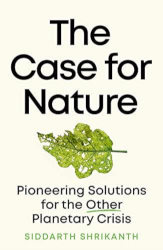 LEX Copyright Iroda |
|||
| E-mail: lexcopy@lexcopyright.hu – írjon nekünk! | |||
| Céginformáció | Újdonságok | Szerzőink | |
| Képviseleti lista | In English | ||
THE CASE FOR NATURE: Pioneering Solutions for the Other Planetary Crisis

For readers of Bill Gates’ How to Avoid a Climate Disaster, On Fire by Naomi Klein, The Sixth Extinction by Elizabeth Kolbert, Losing Earth: The Decade We Almost Stopped Climate Change by Nathaniel Rich and David Wallace Wells’ The Uninhabitable Earth, and fans of Sir David Attenborough.
Rights: UK & Commonwealth: Duckworth Books; Audio: WF Howes; Indian subcontinent (English): Allen Lane India (PRH)
This book will explain how nature can save the world.
Sir David Attenborough makes the emotive and moral case for nature.
This book makes the economic and financial case for nature.
After watching one of Sid David’s documentaries, you are in awe and inspired to act; this book will explain what we can do and how.
The book is about the pioneers in different parts of the world who have discovered and successfully apply solutions to solve local issues that can be replicated globally.
Nature is the answer to both saving our precious world and to successful sustainable economic growth: this book explores how to do it.
‘In the face of both the climate crisis and our planet’s biodiversity crisis, we must rethink our relationship to nature and redouble our efforts to protect and conserve our precious ecosystems. In The Case for Nature, Siddarth Shrikanth provides clear and tangible examples of how doing so will not only safeguard humanity’s future, but fuel economic growth and prosperity’ Al Gore, former Vice President of the United States, Chairman of Generation
The case for tackling climate change on its own is the case for ensuring human survival; the case for nature is, ultimately, the complementary case for securing a living planet worth living for; one that appeals to both the head and the heart; that offers a radical, hopeful, and pragmatic path forward to regenerate our planet and revive our economies and societies along the way.
Our planet teeters on the brink of environmental catastrophe. Cutting emissions is essential but won’t be enough. We also need to harness the power of nature, and the key lies in recognising both that the natural world is priceless, and that it has measurable economic value. Restoring biodiversity – aided by technological and financial innovation – will unlock environmental protections and economic benefits. THE CASE FOR NATURE sets out with powerful clarity how protecting nature is both the right thing to do, and firmly in our economic interests; how, taking a cue from a range of indigenous worldviews, nature must be woven into our modern societies, not set apart.
Natural climate solutions – including habitat restoration, soil carbon sequestration, regenerative agriculture and ocean protection – have become a key focus as we seek to slow the climate crisis. But the notion of "natural capital" – of valuing the many services that nature provides us for free – has remained the preserve of academics and practitioners, even as discussions on climate change and decarbonisation have become increasingly mainstream.
While many academic and specialist titles have been written on the topic of natural capital, uniquely accessible, the book features the stories of pioneers who are bringing the economic case for nature to life: restoring nature while reinvigorating communities. They span the globe, from Maasai herders using technology and ecosystem markets to secure their ancestral rangelands, to the formerly shark-hunting dive-guides of Fiji, to the nature-positive farmers of England and the green city-planners of Singapore. Readers will be transported from the jungles of Indonesia to the reefs of Micronesia, and leave with the tools they will forge a new relationship with nature, steer clear of greenwashing, and make meaningful contributions in their professional and personal lives.
Economic logic can only complement a deeper sense of wonder and respect for nature; this book gives readers the tools they need to answer the fundamental questions we must all ask ourselves: what relationship do we want with our living planet, and how can we live from, in, with, and perhaps even as, nature?
The following regions feature prominently in the book: Americas: USA (incl. California), Colombia, Costa Rica, Brazil, Belize; Europe: UK, European cities; Asia-Pacific: India, Singapore, Indonesia, Australia, New Zealand, Fiji, Palau; Africa: Kenya, South Africa.
Siddarth Shrikanth grew up in India and studied conservation biology and climate science at Oxford, later joining McKinsey and Company in London where he worked on helping corporates and governments craft sustainability strategies. He was on the founding team of McKinsey's environmental incubator, McKinsey.org, and led the Rethinking Recycling programme in Indonesia. Siddarth joined the Financial Times as a foreign correspondent in Hong Kong, before spending three years in America pursuing a concurrent MPA/MBA from the Harvard Kennedy School and Stanford's Graduate School of Business. During his time as a graduate student, he helped found Working Trees, a natural carbon removal startup, and consulted for the Singapore PM's office and the World Bank. He is now based in London and works as an investment professional at Just Climate. In his spare time, Siddarth is an avid scuba diver.
| 1054 Budapest, Szemere u. 21. Tel: (06-1) 332-9340 Fax: (06-1) 331-6181 | |||
| Info | |||